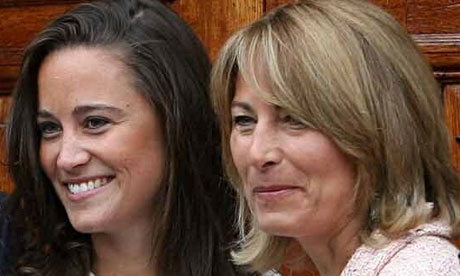Resources and analysis on the topic of media regulation, particularly for the A2 Media exam, Section B. Major case studies include the film industry, music video and the press, with major players such as Murdoch, OfCom and the government considered. If using materials from this blog, please credit the source - Dave Burrowes, Media Studies @ St George's School
Exam date
Some key posts and resources
- 2019 and earlier IPSO cases
- 2021 overview
- BBFC historic bans, subjective judgement?
- BBFC Human Centipede 2
- BBFC overview essay style writing
- BBFC overview with vids
- BBFC U/PG cases Postman Pat--Paddington--Watership Down
- Daily Mail IPSO google
- EU press flak
- IPSO arbitration fines scheme
- IPSO children rulings
- IPSO PCC arguments FOR
- Murdoch flak/conc of ownership
- MUSIC RACISM drill musicians criminalised
- Press reg history (website)
- Privacy 2018 summary
- Social media alt to IPSO?
- Social media as alt reg/FAANGS power up to early 2019
- StopFundingHate
- Tabloid Corrections
- Telegraph libel payout AFTER IPSO ruling unsatisfactory
- The Rock Daily Star Insta
Monday 28 November 2011
X Factor in new product placement row with OfCom
The show seems to be determined to the equivalent of the Daily Mail, the paper the PCC has had most investigations into: every week some new controversy arises, the latest being accusations that Tulisa's arm tattoo, given prominence by her tiresome arm salute at the show's opening, is effectively an ad for her new perfume. OfCom is investigating. See http://www.metro.co.uk/tv/882434-x-factors-tulisa-contostavlos-investigated-by-ofcom-over-arm-gesture
Wednesday 16 November 2011
BBC/OfCom + DRM
Long but fascinating article, from which I'll add an excerpt then the fullt thing below
Esseentially, the BBC has somehow gotten OfCom to agree to allowing it to add DRM (digital rights management) to its broadcasts, in contravention of European (and even American) norms; the practice is widely banned. The article gets at the lack of openness and accountibility of the 'independent' OfCom - tho' would this differ if it was a government agency? (Perhaps questions would be asked in parliament or in the DCMS Select Committee?)
Full article link
Excerpt:
Full article:
Esseentially, the BBC has somehow gotten OfCom to agree to allowing it to add DRM (digital rights management) to its broadcasts, in contravention of European (and even American) norms; the practice is widely banned. The article gets at the lack of openness and accountibility of the 'independent' OfCom - tho' would this differ if it was a government agency? (Perhaps questions would be asked in parliament or in the DCMS Select Committee?)
Full article link
Excerpt:
In other words, "Auntie knows best, so shut up and run along and let us get on with breaking your TV."
Ofcom was equally unhelpful in explaining why any of this material passed muster in its "case by case" evaluation of confidentiality. Rather, it switched back to its statement that it had to take all claims of confidentiality at face value, and freedom of information seekers need not apply when one of the companies it is meant to be regulating tells it to keep mum, no matter how compelling the public interest and how unconvincing the claimed need for confidentiality.
And now we're gearing up for DRM Britain. Our BBC will give privileges to American TV companies that the US government won't give them, and our "independent" regulator won't even tell us why.
In the new DRM world, the rights you've enjoyed to your licence-fee-paid material are now contingent. If you want to save your copies to your computer, transfer them to your tablet or phone, loan them to your neighbours, excerpt them for education, criticism or parody, you're going to have to ask a committee for permission. If your kids want to do these things, they're going to have to seek this permission as well, and if you have the sort of children who aren't comfortable making submissions to regulatory committees, then your children won't be able to do what other children all over the world are accustomed to doing.
Full article:
Series: Digital rights, digital wrongs
How the BBC's HD DRM plot was kept secret … and why
Corporation's Ofcom submission reveals it is willing to give privileges to US TV companies they can't get at home

The BBC lobbied for DRM to be included on
all Freeview HD receivers, offering shows such as Frozen Planet.
Photograph: Jason Roberts/BBC
Back in 2009, the BBC
approached Ofcom for permission to add "digital rights management"
locks to its high-definition broadcasts. The locks would work by
scrambling some of the information used to decode video, and in order to
get the descrambling key, manufacturers would have to submit to the
rules of the DTLA, an offshore consortium led by Intel.
This was a strange request for the BBC to make. There aren't any licence fee payers who put a cheque in the post this year and thought, "Gosh, I wish there was a way I could do less than the law allows with the video my licence fee pays for." The BBC has always eschewed DRM in its Freeview offerings, and other public broadcasters in Europe, the US and Canada eschew DRM. German law prohibits DRM on its public broadcasts, and American law prohibits DRM on all broadcasts, both commercial and non-commercial.
What's more, the DRM scheme proposed by the BBC had three major flaws: first, technical experts believed it would be trivial to defeat; second, the part of the broadcast that the BBC wanted to scramble was shared by closed captions and assistive audio tracks used by disabled people; and finally, the full rules set out by DTLA for its DRM were governed by confidentiality agreements, which meant that UK manufacturers would be ordered to comply with a set of secret rules that the public wasn't allowed to know.
This was a strange request for the BBC to make. There aren't any licence fee payers who put a cheque in the post this year and thought, "Gosh, I wish there was a way I could do less than the law allows with the video my licence fee pays for." The BBC has always eschewed DRM in its Freeview offerings, and other public broadcasters in Europe, the US and Canada eschew DRM. German law prohibits DRM on its public broadcasts, and American law prohibits DRM on all broadcasts, both commercial and non-commercial.
What's more, the DRM scheme proposed by the BBC had three major flaws: first, technical experts believed it would be trivial to defeat; second, the part of the broadcast that the BBC wanted to scramble was shared by closed captions and assistive audio tracks used by disabled people; and finally, the full rules set out by DTLA for its DRM were governed by confidentiality agreements, which meant that UK manufacturers would be ordered to comply with a set of secret rules that the public wasn't allowed to know.
Monday 14 November 2011
PCC: New chairman Lord Hunt interviewed
This article highlights the Establishment nature of the PCC: Hunt is the 3rd Tory peer to become PCC chairman (after Lord Wakeham + Lady Buscombe) + only took up the post after Wakeham sold the idea to him. Denying tabloids are the main issue facing the press is a curious starting point, though he does seem keen to extend PCC powers. Its still in the balance whether or not the Levinson inquiry will lead to the closure of the PCC of course...
Article link: http://www.guardian.co.uk/media/2011/nov/13/lord-hunt-pcc-interview
Article link: http://www.guardian.co.uk/media/2011/nov/13/lord-hunt-pcc-interview
PCC chairman Lord Hunt: the greater challenge is with bloggers
He quotes Wilkes and Thatcher, admits he doesn't know much about how papers work, and reveals how he will run the PCC
-
 Roy Greenslade
Roy Greenslade
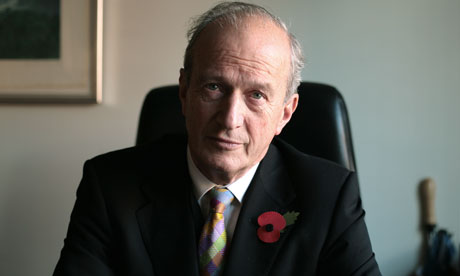
Lord Hunt: 'I have arrived [at the PCC] with a blank piece of paper.' Photograph: Martin Godwin for the Guardian
So Lord Hunt, why did you apply for the poisoned chalice that is the chairmanship of the Press Complaints Commission?
Sunday 13 November 2011
Guardian editor proposes new press regulator
The Guardian editor proposes a PCC-replacement he calls the Press Standards Mediation Commission (PSMC)
Guardian editor proposes new press regulator
Alan Rusbridger calls
for new independent body 'with teeth' that offers a 'one-stop shop'
mediation service for libel and privacy
Lisa O'Carroll
Friday 11 November 2011
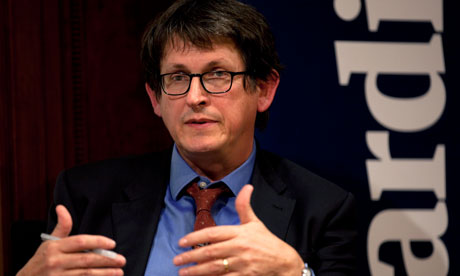
The Guardian editor Alan Rusbridger has
proposed a new independent regulartor to replace to current Press
Complaints Commission. Photograph: Teri Pengilley
The Guardian's editor-in-chief has proposed a new independent
press regulator with teeth, offering a "one-stop shop" mediation service
for libel and privacy.
Alan Rusbridger, delivering the annual Orwell lecture, said he believed a new regulator, armed with powers to investigate, could offer a "quick, responsive, and cheap" way of resolving disputes.
It would be "our own one-stop shop disputes resolution service so that people never had to go to law to resolve their differences with newspapers".
Rusbridger suggests the new body could be entitled the Press, Standards and Mediation Commission (PSMC) and would replace the existing Press Complaints Commission, which is facing the axe after the Leveson inquiry publishes its findings.
He supported calls by the Daily Mail editor-in-chief Paul Dacre for a press ombudsman who could investigate serious lapses of standards on a "polluter pays" basis.
Rusbridger proposed that the PSMC would have a small number of staff to deal with libel cases in particular, with a panel of qualified mediators.
He suggested mediators could: decide on fairness and accuracy; whether the disputed article was opinion or an allegation of fact; whether it was in the public interest; whether the complainant had a reasonable chance to respond and whether their response was included.
Rusbridger also called on the industry and any other interested parties to come up with an agreed definition of "the public interest – and stick to it".
"If we fight legal actions and mount campaigns over articles that even we don't pretend are in the public interest as we define it, aren't we inviting people to be cynical about our motives and out commitment to self-regulation?" he asked.
Rusbridger said it was an "incredibly anxious time for journalism, with even the most powerful and professional newspapers clinging on to financial viability", and the Leveson inquiry would make for some "uncomfortable" moments.
But he said that while the upcoming Leveson inquiry may well uncover some "uncomfortable truths" about the way a number of journalists have acted in the past, that was "surely good, not bad".
Shining a light on bad practice would lead to good outcomes, he said, as transparency normally did.
"Leveson provides an opportunity for the industry to have a conversation with itself while also benefiting from the perspective and advice of others," Rusbridger added.
He said it provided "a-once-in-a-generation chance to celebrate great reporting" and to think again about what journalism at its best can do and what it should be.
Alan Rusbridger, delivering the annual Orwell lecture, said he believed a new regulator, armed with powers to investigate, could offer a "quick, responsive, and cheap" way of resolving disputes.
It would be "our own one-stop shop disputes resolution service so that people never had to go to law to resolve their differences with newspapers".
Rusbridger suggests the new body could be entitled the Press, Standards and Mediation Commission (PSMC) and would replace the existing Press Complaints Commission, which is facing the axe after the Leveson inquiry publishes its findings.
He supported calls by the Daily Mail editor-in-chief Paul Dacre for a press ombudsman who could investigate serious lapses of standards on a "polluter pays" basis.
Rusbridger proposed that the PSMC would have a small number of staff to deal with libel cases in particular, with a panel of qualified mediators.
He suggested mediators could: decide on fairness and accuracy; whether the disputed article was opinion or an allegation of fact; whether it was in the public interest; whether the complainant had a reasonable chance to respond and whether their response was included.
Rusbridger also called on the industry and any other interested parties to come up with an agreed definition of "the public interest – and stick to it".
"If we fight legal actions and mount campaigns over articles that even we don't pretend are in the public interest as we define it, aren't we inviting people to be cynical about our motives and out commitment to self-regulation?" he asked.
Rusbridger said it was an "incredibly anxious time for journalism, with even the most powerful and professional newspapers clinging on to financial viability", and the Leveson inquiry would make for some "uncomfortable" moments.
But he said that while the upcoming Leveson inquiry may well uncover some "uncomfortable truths" about the way a number of journalists have acted in the past, that was "surely good, not bad".
Shining a light on bad practice would lead to good outcomes, he said, as transparency normally did.
"Leveson provides an opportunity for the industry to have a conversation with itself while also benefiting from the perspective and advice of others," Rusbridger added.
He said it provided "a-once-in-a-generation chance to celebrate great reporting" and to think again about what journalism at its best can do and what it should be.
Bye bye Berlusconi
The UK has come perilously close to the political/media monopoly enjoyed until this week by Silvio Berlusconi; here's an article which provides an overview of his political career, and a particular section I'll copy in first:
For as long as Bossi withheld his support, Berlusconi was to remain out of office. He lost the 1996 general election and might well have been reduced to political insignificance subsequently had the centre-left taken the opportunity to blunt his most formidable political weapon. But, in the late 1990s, Berlusconi tricked the leader of the ex-communists, Massimo D'Alema, into believing he would back a grand project for constitutional reform in exchange for a promise not to dismantle his near-monopoly of commercial television. D'Alema never got his reform, but Berlusconi kept effective control of his TV channels.
His apologists mock the idea that Italians would take their instructions from his three channels, and point out that Berlusconi's ownership of the Mediaset network did not stop him from twice being defeated at the polls. But it is also true that his sway over television (reinforced when he was in office to include all but two of the seven main national channels) helped create an environment in which he could thrive (and later survive).
If Italians were unable to grasp the seriousness of the financial misdemeanours of which he was accused, if they were willing to give the benefit of the doubt to his claim that he was a victim of politically motivated prosecutors, if they were untroubled by his anachronistic sexism, and if latterly they failed to grasp the extent to which Berlusconi was held in contempt outside Italy, it was to a large extent because of what was said – and not said – on their small screens.
Silvio Berlusconi: a story of unfulfilled promises
The most influential Italian politician since Mussolini has done much to damage his country's standing and prospects
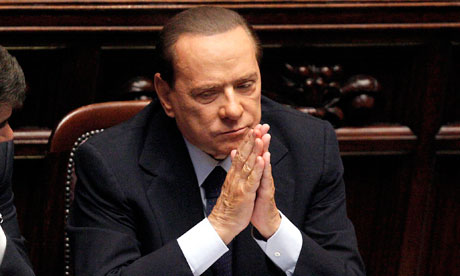
Silvio Berlusconi has weakened the rule
of law in Italy, but failed to keep his promise to make his compatriots
rich. Photograph: Giuseppe Lami/EPA
The resignation of Silvio Berlusconi has very likely put an end to the most colourful, eventful, improbable and destructive career in Italy's recent political history.
No Italian since Mussolini has made such a lasting impression on his country. And none has done as much to damage its prospects and standing in the rest of the world.
The story of Berlusconi's involvement with the public life of his country was one of repeatedly unfulfilled promises. He entered politics vowing to transform and unify the Italian right. And, as recently as 2009 when he founded his Freedom People movement, it looked as if he might realise his dream. Yet he is going at a time when Italy's conservatives have never been as divided or demoralised.
No Italian since Mussolini has made such a lasting impression on his country. And none has done as much to damage its prospects and standing in the rest of the world.
The story of Berlusconi's involvement with the public life of his country was one of repeatedly unfulfilled promises. He entered politics vowing to transform and unify the Italian right. And, as recently as 2009 when he founded his Freedom People movement, it looked as if he might realise his dream. Yet he is going at a time when Italy's conservatives have never been as divided or demoralised.
Sunday 23 October 2011
Mail articles on children
One of our key case studies is included in this, but click through http://tabloid-watch.blogspot.com/search/label/children to see a range of dubious Mail articles about children
Tuesday 18 October 2011
ITV consolidates further: buys ChannelTV
ITV plc buys Channel Television
Acquisition of Channel Islands service leaves STV and UTV as only independently held channel 3 broadcasters. By Tara Conlan
Thursday 22 September 2011
Villains and Heroes: Met attacks Guardian, uses Official Secrets Act
I'd thought this story had run out of potential shock value, but the Met Police, exposed by the Guardian as strangely unwilling to properly investigate Hackgate and now forced, under pressure from Parliament, to investigate why its investigation was so lax, decided in Sept 2011 to attack ... The Guardian!!!
Bit cheeky, not to say reeking of vengeance!
The CPS (Crown Prosecution Service) forced them to back down, but they've exposed how obscure legislation can still play a part in muzzling a free press, and covering up stories that figures in the Establishment would rather be kept hidden from public knowledge.
The Guardian's Hackgate microsite has links to all the stories on this and more, but here's a couple of excerpts from just one, Jonathan Freedland's savage attack on the Met:
Bit cheeky, not to say reeking of vengeance!
The CPS (Crown Prosecution Service) forced them to back down, but they've exposed how obscure legislation can still play a part in muzzling a free press, and covering up stories that figures in the Establishment would rather be kept hidden from public knowledge.
The Guardian's Hackgate microsite has links to all the stories on this and more, but here's a couple of excerpts from just one, Jonathan Freedland's savage attack on the Met:
The entire British press, including the Murdoch-owned Times, joined in lambasting the stupidity of shooting the messenger in this way. As the Telegraph put it: "Are they seriously contemplating that the first prosecutions arising from the phone-hacking scandal should involve the very people who exposed it?" Or, to quote my colleague Marina Hyde, the Met showed itself to be "not tough on crime, tough on the reporting of crime".The detail of the Met's case was even more laughable. Among stories it described as "gratuitous" – literally, without merit – and not in the public interest was the revelation that the News of the World had hacked into Milly Dowler's voicemail. The textbooks of the future will struggle to find a better example of a story in the public interest than that one: it had an enormous public impact, from the closure of the NoW and abandoning of the BSkyB bid to the departure of the Met's commissioner and one of his most senior officers. The Met called it gratuitous, but when the previous commissioner, Sir Paul Stephenson, appeared before MPs in July, he lavished praise on the Guardian for persisting where three inquiries by his officers had failed. Even in its statement last week, the Met paid tribute to this paper's "unwavering determination to expose the hacking scandal". So what was the Met position, that the coverage was gratuitous or praiseworthy?But worst was the Met's abuse of the Official Secrets Act. That legislation has been used to pressure journalists to reveal their sources before, whether in the Shayler or, much earlier, Vassall episodes, but the substance of those cases related to genuine affairs of state and national defence: think Clive Ponting and the Belgrano. What was at stake substantively this time was not the safety of the realm, even cynically defined, but criminality inside a powerful corporation. Of course the Met would want to pursue a leaker in its midst, but to invoke the Official Secrets Act was to abuse the law – and for no better purpose than to try and force a Guardian reporter to reveal their confidential sources, which is barred under the act. The courts would surely have thrown out this order, realising the chilling effect it would have had on journalistic inquiry, which in the phone-hacking affair proved the only protection available when both police and politicians so signally failed. Perhaps a phone call from the attorney general or director of public prosecutions spelled that point out to the new commissioner....More widely, the police have the enormous task of establishing whether criminal activity was not just conducted at the margins but somehow central to how the business worked. It is striking that so many of the targets of News of the World hacking were political, very many of them Labour politicians. Was this the modus operandi, gathering dirt on public figures by criminal means as a form of currency, a threat held in reserve to pressure policymakers to tilt the regulatory playing field in favour of Murdoch's multiple media interests?One highly respected, establishment figure believes that this eventually operated in a directly partisan way, that News International was, in effect, running a shadow intelligence operation, funnelling the information it gathered on the Conservatives' political enemies to that party – in return for benign treatment of its businesses.But it might not always have run on such party political lines. The police have before them a complaint from Gordon Brown. He believes he was targeted as early as 2000 by a "blagger" working for the Sunday Times who sought access to Brown's legal and financial records, apparently in search of damaging information. That cannot have been designed to help the Tories: at that time the Murdoch papers strongly backed Tony Blair, whose only serious rival for power was Brown.We don't know the truth of these allegations or of the many others that still surround News International and the phenomenal power it has exerted over British public life. We need the police to help discover the truth – not to hound those determined to find it.
Tuesday 13 September 2011
Consolidation in music industry: BMG buys another company
'Consolidation', eventually leading to monopoly, is the inevitable path of every large industry, at least according to Marxist critiques of free market theory and capitalism. The very existence of market regulation shows that this is generally accepted up to a point, and is an acknowledgement of a need to step in and prevent 'free markets' from destroying competition.
Here's just ONE recent example of this ongoing process in the music biz, already globally dominated than even fewer conglomerates than in the film industry.
SOURCE: http://www.guardian.co.uk/business/2011/sep/12/bmg-buys-bug-music
Here's just ONE recent example of this ongoing process in the music biz, already globally dominated than even fewer conglomerates than in the film industry.
SOURCE: http://www.guardian.co.uk/business/2011/sep/12/bmg-buys-bug-music
John Plunkett 12.9.11BMG buys music publisher Bug Music
Bertelsmann and private equity joint venture acquires rights to songs by artists including Johnny Cash and Kings of Leon
BMG Rights Management has bought music publisher Bug Music in a deal reported to be worth more than $300m.
BMG, a joint venture between German media giant Bertelsmann and US private equity group Kohlberg Kravis Roberts, beat rival bidders including Pop Idol creator Simon Fuller.
Los Angeles-based Bug Music represents the estates of Johnny Cash, Muddy Waters and Woody Guthrie, as well as contemporary artists including Kings of Leon, Ryan Adams and The National.
BMG bought Bug Holdings and its subsidiary, Bug Music, from Spectrum Equity Investors and Crossroads Media in a deal announced on Monday. Financial terms of the transaction were not disclosed.
"With the acquisition of Bug Music and its vast collection of evergreen and contemporary compositions, BMG further establishes itself as a leading music rights management company," said the BMG Rights Management chief executive, Hartwig Masuch.
Bug Music was founded in 1975 and owns or manages copyrights to songs including Fever, What A Wonderful World, The Real Slim Shady and The Passenger.
PCC deal to remove Middleton pics from Mail +2 papers
Once more it seems the PCC can act to protect the most privileged. Even so, will it still be too little too late for the PCC, or will they still have a future once the reviews into media regulation are completed?
Article from the always-readable Roy Greenslade.
Article from the always-readable Roy Greenslade.
Three papers remove Middleton pictures from their websites
Press Complaints Commission brokers deal on behalf of Duchess of Cambridge's family
Pippa and Carole Middleton
Three national newspapers have removed pictures of the Duchess of Cambridge's family (the Middletons) from their websites.
The Daily Mail, Mail on Sunday and Daily Mirror agreed to take down the images and never to republish them as part of a deal negotiated by the Press Complaints Commission.
The pictures of the Middletons and Prince William, aboard a boat moored off the island of Ibiza, had been taken five years before the papers published them in May.
Seven photographs appeared in the Mail on Sunday under the headline "Perfect Pippa – and the Prince of Belly Flops". They showed Kate and Pippa Middleton, both wearing bikinis, while swimming, diving and sun-bathing. Their mother, Carole, was also shown in a bikini.
Several shots from the same set then appeared in the Daily Mail and the Mirror.
Carole Middleton complained – through the law firm Harbottle & Lewis – to the PCC in company with her daughter, Pippa, and son, James, that the images invaded their privacy.
They argued that the pictures were taken in 2006 in a place where the family had "a reasonable expectation of privacy" (and therefore breached the editors' code of practice).
They alleged that the photos were taken after their boat had been pursued.
Pippa Middleton made a third complaint about the publication of an image by the Daily Mirror showing her sunbathing on the boat.
In all cases the complainants argued that they had a reasonable expectation of privacy.
As expected, the three papers defended publication by saying that the images had been published on several occasions since 2006 and had not attracted complaint.
They also denied that the boat had been followed and further argued that the Middletons didn't have a reasonable expectation of privacy "at the location in which the boat was situated".
PS: The now-defunct News of the World also carried the pictures on its front page with the headline "Oh buoy it's Pippa... and she's topless inside". Its website has, of course, been taken down in its entirety.
I will post a comment on this later.
Source: PCC
Jeremy Hunt to ask Ofcom to measure cross-media ownership in UK
In the past both Labour and the Tories have rather blatantly helped out their one-time buddy Rupert Murdoch by refusing to measure and place limits on cross-media ownership, something which even the ligh-touch regulation of the USA does. This has helped him to build up both the dominant TV network and share of the national press.
Read the following article carefully though and what comes out is a disappointing ideological attack on the BBC more than News Corp - the Tory Party has long been ideologically opposed to the BBC, seeing anything state-owned as problematic and privatised/privately owned companies as superior.
Media regulation could well be a big issue at the next general election.
SOURCE: http://www.guardian.co.uk/media/2011/sep/11/jeremy-hunt-ofcom-media-ownership
Read the following article carefully though and what comes out is a disappointing ideological attack on the BBC more than News Corp - the Tory Party has long been ideologically opposed to the BBC, seeing anything state-owned as problematic and privatised/privately owned companies as superior.
Media regulation could well be a big issue at the next general election.
SOURCE: http://www.guardian.co.uk/media/2011/sep/11/jeremy-hunt-ofcom-media-ownership
Jeremy Hunt to ask Ofcom to measure cross-media ownership in UK
Culture secretary plans to use results to set limits for market share held by Rupert Murdoch and the BBCDan Sabbagh 11.9.11
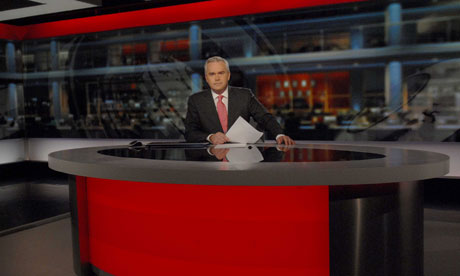
Huw Edwards on the BBC News set. The corporation's news coverage reaches 81% of the UK population each week
Jeremy Hunt, the culture secretary, will this week ask the media regulator Ofcom to establish an agreed means of measuring cross-media power in the UK and consider whether to set a limit for the market share of Rupert Murdoch or the BBC to cap their influence over British media.
In the wake of the row surrounding Murdoch's abortive bid for BSkyB, the minister wants Ofcom to create a common currency for measuring media ownership that would stretch across TV, newspapers, radio and other media. His ambition is to use this to introduce a new set of cross-media ownership rules.
At present, the only restriction prevents any newspaper owner who accounts for more than 20% of total circulation – such as Murdoch's News Corporation – from owning more than 20% of ITV.
Significantly, Hunt wants Ofcom to examine whether it would be "practical or advisable to set absolute limits on news market share" – a restriction that is as likely to affect the BBC as News Corp.
Hunt, who will speak on Wednesday evening to broadcast executives at the Royal Television Society festival in Cambridge, is expected to say that Britain needs to agree "a new framework for media plurality in a cross-media world".
He is expected to add: "We first need to better understand how we should measure plurality across platforms. I intend to ask Ofcom to examine what the options are for measuring media plurality in our digital age, and recommend the best approach."
Ofcom was asked to review News Corp's proposed takeover of BSkyB under "media plurality" grounds last autumn, the first time any UK media merger had been examined in such a fashion, amid complaints from rivals that the enlarged company would dominate British media.
News Corp's newspapers had a 37% market share at the time, which would have been combined with the largest broadcaster in BSkyB if the merger had gone through.
With no agreed methodology to fall back on, Ofcom devised various ways of measuring cross-media power and concluded that a combined News Corp and BSkyB would have too great an influence over news. Ofcom decided to measure "minutes of media use" to devise a common currency embracing newspapers and broadcasters.
It concluded that the privately owned News Corp, when combined with Sky, would account for a 22% "share of reference" for British news and that the combined company would reach 51% of all Britons with its news each week.
That would have made News Corp easily the largest commercial news provider in the UK.
However, Ofcom's data revealed the BBC was easily the largest supplier of news. Its share of reference was measured at 37%, with 81% of the population consuming BBC news each week.
But, unlike Murdoch's newspapers – which backed the Conservatives at the last election – the publicly funded BBC is politically impartial.
Ofcom is expected to take several months to complete the exercise.
Its results will be shared with Lord Justice Leveson's inquiry into the regulation of the media.
OfCom censure Brick FM over 'panini'...
Although we focus on TV, not radio, an interesting example here of how OfCom monitor even small-scale community radio. Also a very intriguing argument put up by the proprietors of Brick FM that Scots don't find the word f**k offensive - could be used to support the argument that OfCom is too metropolitan, too London-centric.
SOURCE: http://www.guardian.co.uk/media/2011/sep/12/radio-station-grilled
SOURCE: http://www.guardian.co.uk/media/2011/sep/12/radio-station-grilled
John Plunkett 12.9.11Radio station grilled over 'panini' swearword
Station claims Scottish listeners do not find F-word offensive – and sexual slang word in song means Italian sandwich
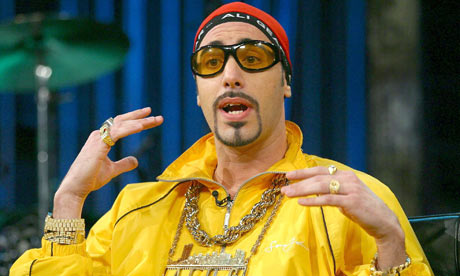 |
| The slang word used in the song played by Brick FM was made popular by TV character Ali G |
When is a sexual slang word not a sexual slang word? When it is
an Italian cheese sandwich, according to a community radio station on
the Scottish borders.
Brick FM was hauled before media regulator Ofcom after appearing to breach broadcasting regulations by playing songs which included the word "fuck" and "punani".
Station management defended the broadcasts, saying "fuck" was a "commonly used word in Scotland which is not considered offensive locally" and went as far to suggest that Ofcom was "unfamiliar with [the] local dialect".
Brick FM was hauled before media regulator Ofcom after appearing to breach broadcasting regulations by playing songs which included the word "fuck" and "punani".
Station management defended the broadcasts, saying "fuck" was a "commonly used word in Scotland which is not considered offensive locally" and went as far to suggest that Ofcom was "unfamiliar with [the] local dialect".
Unions vote for 'conscience clause' to cover journalists
The NUJ has been campaigning for journalists to have the write to refuse to engage in behaviour which they consider unethical, something the press barons have also (successfully) opposed. How much of a typical tabloid could be considered 'ethical'?!
SOURCE: http://www.guardian.co.uk/politics/2011/sep/12/unions-conscience-clause-tuc-conference
SOURCE: http://www.guardian.co.uk/politics/2011/sep/12/unions-conscience-clause-tuc-conference
Unions vote for 'conscience clause' to cover journalists
The TUC conference has called for a law to protect those put under pressure to take part in unethical media practices
Hélène Mulholland
guardian.co.uk,
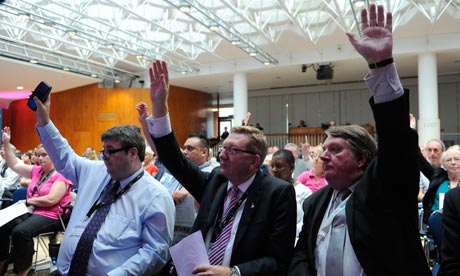 |
| Union delegates, including Len McCluskey, general secretary of Unite (centre), vote during the annual TUC conference |
Unions have unanimously voted for journalists to be covered by a
legally-binding "conscience clause", following the phone-hacking
scandal at the News of the World.
Michelle Stanistreet, the general secretary of the National Union of Journalists (NUJ), made the call for a law to protect journalists who are put under pressure to take part in unethical media practices, during a wide-ranging debate on the threat to trade union rights in the workplace, at the TUC conference in London.
She told delegates there was a clear link between "union-busting" at News International and the "moral vacuum" that had been allowed to exist.
Michelle Stanistreet, the general secretary of the National Union of Journalists (NUJ), made the call for a law to protect journalists who are put under pressure to take part in unethical media practices, during a wide-ranging debate on the threat to trade union rights in the workplace, at the TUC conference in London.
She told delegates there was a clear link between "union-busting" at News International and the "moral vacuum" that had been allowed to exist.
Monday 5 September 2011
OfCom question future of PSB - can't sanction ITV/C5?
The following article is incredibly useful for solid info on 1 of the strands of this exam topic: the FUTURE shape and direction of media regulation. In essence the current national TV licenses (for ITV + C5) are set to expire in 2014. These media companies already argue that the financial benefits they once got from access to the analogue signal (meaning every TV could receive them, without need of subscribing to Sky, Virgin etc) are already too small these days, never mind when digital switchover is completed for the end of 2012. ITV bluntly told OfCom they'd continue to cut regional news, part of their required PSB output under the license agreement, regardless of any sanctions from OfCom - if they had to hand back their license and continue as a digital-only company, they'd do so.
The article also mentions 'the next communications bill, due before the next general election in 2015'. Given the huge public outcry over Hackgate, this should be a major shakeup of the way our media are regulated. We will discuss likely outcomes of this, something you need to be able to provide an informed opinion on for your exam.
[Read more Guardian articles on PSB here]
ARTICLE SOURCE: http://www.guardian.co.uk/media/2011/sep/02/ofcom-itv-channel-5
The article also mentions 'the next communications bill, due before the next general election in 2015'. Given the huge public outcry over Hackgate, this should be a major shakeup of the way our media are regulated. We will discuss likely outcomes of this, something you need to be able to provide an informed opinion on for your exam.
[Read more Guardian articles on PSB here]
ARTICLE SOURCE: http://www.guardian.co.uk/media/2011/sep/02/ofcom-itv-channel-5
Ofcom 'could not stop ITV and Channel 5 cutting PSB programming'
Media regulator says licence renewal is approach most likely to ensure continuing delivery of key public service objectives
- Mark Sweney
- guardian.co.uk,
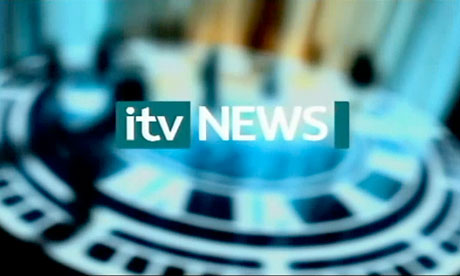
Ofcom has said it does not have the power
to stop commercial broadcasters cutting back public service
programming, such as ITV News
Ofcom has said that the best option to guarantee that ITV and Channel 5 continue delivering news and their other public service broadcasting
commitments is to renew their licences. But the regulator also admitted
that it will not have the power to stop broadcasters cutting back on
PSB programming if they want to.
The admission came on Friday as Ofcom published its government submission on options for renewing Channel 3 (ITV) and Channel 5 licences, which expire at the end of 2014.
Ofcom said that the three options given to Jeremy Hunt, the culture secretary, give him the "choice between stability and disruption" by either maintaining the status quo and renewing the existing licences or tearing them up and rethinking how, and in what form, public service TV content might be delivered in future.
Ofcom said that the first option, that of renewing the existing licences with the same broadcasters for another decade, is probably the best bet if viewers want to continue to see PSB content on TV.
"In the medium term licence renewal is the approach most likely to ensure the continuing delivery of the key public service objectives of supporting investment in original programming and news provision," Ofcom said in its 36-page submission to Hunt.
However Ofcom notes that there is a "high degree of uncertainty" surrounding the commercial sustainability in a volatile UK broadcasting market of a licence running for 10 years from 2014.
Ofcom's commercial PSB licences give holders benefits which have historically been financially very valuable, primarily reserved access to broadcast on strictly limited terrestrial spectrum and more recently on digital terrestrial TV, or Freeview. Licensees are also guaranteed prominence in the digital TV electronic programme guides.
In return broadcasters have had to guarantee delivery of a range of PSB content, such as national and regional news for ITV licensees, and investing in original UK programming.
However, broadcasters such as ITV have vigorously lobbied, and Ofcom has concurred, that the value of the PSB licences are less than the cost of delivering PSB programming that is often expensive to make and delivers low audiences.
The PSBs have already moved to cut back on some of their obligations – under former executive chairman Michael Grade ITV threatened to pull out of regional news altogether – despite the sanctions at Ofcom's disposal to punish licence breaches.
"It is uncertain whether the regulatory enforcement mechanisms currently in place would be sufficient to prevent licensees from seeking to pare back delivery of public service content in the future in response to unfavourable market conditions," said Ofcom.
The media regulator admitted that "some form of agreement" would have to be reached with broadcasters to make sure PSB content was delivered "until the mid-2020s" – meaning some reduction in obligations agreeable by both sides.
This option might also allow parliament to amend the structure of Ofcom broadcast licences covering the UK to look at options such as the creation of a separate licences for Channel 3 in Wales and Scotland, which is covered currently by three licences (Border, owned by ITV plc, and STV and Grampian, owned by STV).
The second option is to cancel the existing PSB licences and retender to the market for the next period from 2014.
This would give the government a chance to rethink what obligations should be included in the new licences and may also encourage the emergence of new players beyond the traditional PSBs.
"A decision by the secretary of state to block licence renewal would lead to an award process that could lead to the development of new and innovative forms of public service content and drive efficiency," said Ofcom.
Analysts at Citigroup said that such a move could lead to companies including Facebook and Google investigating the potential advantages of PSB provision.
However, Ofcom also notes that it will be difficult for government to change or modify the existing PSB obligations and that it is "unclear" what new bidders would be interested.
Nevertheless Ofcom says that the second option "remains a credible possibility".
The third option is to extend the existing licences to allow for public service broadcasting to be given "full consideration" in the next communications bill, due before the next general election in 2015.
Ofcom said this would allow parliament to assess what the PSB licences should cover in light of the remits of both Channel 4 and the BBC, as well as initiatives such as Hunt's plans for a new network of local TV services.
"For instance, developments in the provision of local TV services in the next few years may lead parliament to reassess the continuing need for English regional programming on Channel 3," Ofcom said.
This option would also allow the government to "clarify and tighten" the regulation around prominence of PSB channels on the EPG "to create additional public service value".
However, Ofcom admits that forcing the existing PSBs to continue delivering on licence obligations they find loss-making may lead them to "consider becoming a fully commercial UK-wide broadcaster". The media regulator admits that ITV for one is set to find the costs of PSB status outweighing the benefits before 2014.
"In those circumstances, it may not be possible to secure a replacement licensee given both the high fixed costs of providing a fully regional service with the existing range of obligations and the short term nature of any licence that Ofcom would be able to offer," said the media regulator.
The admission came on Friday as Ofcom published its government submission on options for renewing Channel 3 (ITV) and Channel 5 licences, which expire at the end of 2014.
Ofcom said that the three options given to Jeremy Hunt, the culture secretary, give him the "choice between stability and disruption" by either maintaining the status quo and renewing the existing licences or tearing them up and rethinking how, and in what form, public service TV content might be delivered in future.
Ofcom said that the first option, that of renewing the existing licences with the same broadcasters for another decade, is probably the best bet if viewers want to continue to see PSB content on TV.
"In the medium term licence renewal is the approach most likely to ensure the continuing delivery of the key public service objectives of supporting investment in original programming and news provision," Ofcom said in its 36-page submission to Hunt.
However Ofcom notes that there is a "high degree of uncertainty" surrounding the commercial sustainability in a volatile UK broadcasting market of a licence running for 10 years from 2014.
Ofcom's commercial PSB licences give holders benefits which have historically been financially very valuable, primarily reserved access to broadcast on strictly limited terrestrial spectrum and more recently on digital terrestrial TV, or Freeview. Licensees are also guaranteed prominence in the digital TV electronic programme guides.
In return broadcasters have had to guarantee delivery of a range of PSB content, such as national and regional news for ITV licensees, and investing in original UK programming.
However, broadcasters such as ITV have vigorously lobbied, and Ofcom has concurred, that the value of the PSB licences are less than the cost of delivering PSB programming that is often expensive to make and delivers low audiences.
The PSBs have already moved to cut back on some of their obligations – under former executive chairman Michael Grade ITV threatened to pull out of regional news altogether – despite the sanctions at Ofcom's disposal to punish licence breaches.
"It is uncertain whether the regulatory enforcement mechanisms currently in place would be sufficient to prevent licensees from seeking to pare back delivery of public service content in the future in response to unfavourable market conditions," said Ofcom.
The media regulator admitted that "some form of agreement" would have to be reached with broadcasters to make sure PSB content was delivered "until the mid-2020s" – meaning some reduction in obligations agreeable by both sides.
This option might also allow parliament to amend the structure of Ofcom broadcast licences covering the UK to look at options such as the creation of a separate licences for Channel 3 in Wales and Scotland, which is covered currently by three licences (Border, owned by ITV plc, and STV and Grampian, owned by STV).
The second option is to cancel the existing PSB licences and retender to the market for the next period from 2014.
This would give the government a chance to rethink what obligations should be included in the new licences and may also encourage the emergence of new players beyond the traditional PSBs.
"A decision by the secretary of state to block licence renewal would lead to an award process that could lead to the development of new and innovative forms of public service content and drive efficiency," said Ofcom.
Analysts at Citigroup said that such a move could lead to companies including Facebook and Google investigating the potential advantages of PSB provision.
However, Ofcom also notes that it will be difficult for government to change or modify the existing PSB obligations and that it is "unclear" what new bidders would be interested.
Nevertheless Ofcom says that the second option "remains a credible possibility".
The third option is to extend the existing licences to allow for public service broadcasting to be given "full consideration" in the next communications bill, due before the next general election in 2015.
Ofcom said this would allow parliament to assess what the PSB licences should cover in light of the remits of both Channel 4 and the BBC, as well as initiatives such as Hunt's plans for a new network of local TV services.
"For instance, developments in the provision of local TV services in the next few years may lead parliament to reassess the continuing need for English regional programming on Channel 3," Ofcom said.
This option would also allow the government to "clarify and tighten" the regulation around prominence of PSB channels on the EPG "to create additional public service value".
However, Ofcom admits that forcing the existing PSBs to continue delivering on licence obligations they find loss-making may lead them to "consider becoming a fully commercial UK-wide broadcaster". The media regulator admits that ITV for one is set to find the costs of PSB status outweighing the benefits before 2014.
"In those circumstances, it may not be possible to secure a replacement licensee given both the high fixed costs of providing a fully regional service with the existing range of obligations and the short term nature of any licence that Ofcom would be able to offer," said the media regulator.
Labels:
C5,
digital switchover,
ITV,
license handback,
OfCom,
PSB
Wednesday 17 August 2011
PCC rejects Wayne Rooney S.Times tax report complaint (Aug 2011)
Source: http://www.guardian.co.uk/media/2011/aug/17/pcc-wayne-times-tax-complaint
Wayne Rooney's complaint over Sunday Times tax story rejected
Manchester United footballer complained to PCC that article was inaccurate and misleading
- Josh Halliday
- guardian.co.uk,
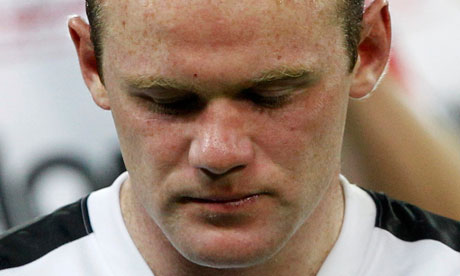
The PCC on Wednesday dismissed Rooney’s complaint. Photograph: Darren Staples/Reuters
The Press Complaints Commission has rejected a complaint from Wayne Rooney over a Sunday Times article that alleged the Manchester United and England footballer had saved hundreds of thousands of pounds due to complex tax arrangements.
Rooney complained the article, headlined "Top footballers dodge millions in income tax: Rooney pays 2% on some earnings", was inaccurate and misleading.
The article, published on 16 January, alleged the England footballer saved almost £600,000 by taking £1.6m in loans rather than income over a two-year period.
Rooney said the headline did not take into account that he was subject to corporation tax of 28% and argued it would not be possible for any person to pay tax of 2% on their earnings. The footballer also complained the article failed to mention he had paid the loan back the following year.
The PCC on Wednesday dismissed Rooney's complaint. Stephen Abell, director of the PCC, said: "This was a complicated financial arrangement and it was important for the commission to consider the circumstances in full.
"The commission's case law consistently makes clear that headlines – which are by their nature reductive – need to be read alongside the accompanying article. Although the PCC has upheld complaints in the past where there has been too great a disparity between the headline and the text of the article, this was not a feature on this occasion. As a result, the complaint was not upheld."
The PCC added that the Sunday Times article made clear that the arrangement was legal and the loan had likely been repaid by Rooney.
Sunday 10 July 2011
Peter Preston reflects on backdrop to PCC's creation
JUNE 2014: Its clear from reading many articles since by Peter Preston that he's a major apologist for/defender of self-regulation for the press - which makes clicking through on his name below and reading up on some of these very useful! He also makes the useful point below that consensus is difficult to reach within the UK press, with the broadsheets often contemptuous of the tabloids, and tempted to let the tabloids be hamstrung by some tighter laws
PP is a grandee of the Guardian, a former editor. The paper is an unlikely defender of the PCC (its recent editorials declare the PCC dead), but PP with this article provides some nice detail on how the PCC came into being, flagging up the industry divide between the tabs/mid market ('red tops') - who feared losing the freedom to sensationalise and invade privacy that underpinned their sales appeal - and the broadsheets - who feared losing the freedom of investigative journalism if statutory regulation were brought in.
Its a useful article then to pick out some arguments for self-regulation, as fundamentally flawed as this has long seemed to be:
Link: http://www.guardian.co.uk/commentisfree/2011/jul/10/pcc-dont-toss-away-freedoms
Fear the void after the PCC
PP is a grandee of the Guardian, a former editor. The paper is an unlikely defender of the PCC (its recent editorials declare the PCC dead), but PP with this article provides some nice detail on how the PCC came into being, flagging up the industry divide between the tabs/mid market ('red tops') - who feared losing the freedom to sensationalise and invade privacy that underpinned their sales appeal - and the broadsheets - who feared losing the freedom of investigative journalism if statutory regulation were brought in.
Its a useful article then to pick out some arguments for self-regulation, as fundamentally flawed as this has long seemed to be:
Link: http://www.guardian.co.uk/commentisfree/2011/jul/10/pcc-dont-toss-away-freedoms
Fear the void after the PCC
I was there when self-regulation was set up: don't let's toss away the freedoms we fought for
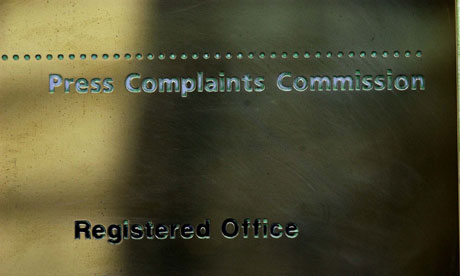
Press Complaints Commission. Photograph: Martin Godwin for the Guardian
It was the last big press crisis before the next one. In 1990 two journalists from the Sunday Sport had sneaked into the hospital bedroom of the gravely injured actor Gordon Kaye and started snapping away. Cue outrage. A government-appointed committee chaired by Sir David Calcutt wanted the old Press Council scrapped and a new Press Complaints Commission established. If it wasn't up and working effectively within 18 months, a statutory tribunal – able to license, ban and injunct – would take its place. Editing this paper, I was close to the action.
My colleague in press freedom campaigning, Frank Rogers, was running the Newspaper Publishers' Association (NPA). Harry Roche, the Guardian group chief executive, had been persuaded to try to raise the millions needed to make transition to a new PCC possible. I was constantly up and down the stairs to the management floor. Which brings us, with a grimace, to what our current PM blithely calls "the industry".
What's the point of self-regulation regimes? To hold on to nurse for fear of something worse – in this case, Downing Street and its associates moving, through new laws, to nobble reporters making waves. Who fears new laws against privacy most keenly? The red-tops and the middle market tabloids, who see much of their business at stake. That's why David English at the Daily Mail and – yes! – Rupert Murdoch were influential behind the scenes in pushing and prodding the PCC into life.
Why on earth was the Guardian involved then? Because we understood, from often bitter experience, that there is not one law for the tabloids and another for the rest: my files were full of legalistic threats about privacy from Robert Maxwell and others. The high farce and high cost of defending the publication of Spycatcher against Margaret Thatcher was still fresh in our minds. And press freedom, all round the world, is snuffed out by government-appointed "press councils".
But did "the industry" agree? One end – the Financial Times end – wasn't very enthusiastic about helping the Daily Star. The Mirror didn't like anything backed by the Sun, and vice versa. The regional press blamed the nationals. Magazine publishers moaned. Several stark voices said: forget commissions and codes and all that stuff; if the politicians want to take us on over individual cases – say the "persecution" of Jeffrey Archer – then let's fight it out. The Sunday Sport isn't a newspaper anyway. Consensus was, and remains, fragile.
Frank Rogers pulled it all together. By the start of 1991 the PCC was up and running. It had no lawyers round the table, because it wanted to deal with complaints fast and cheaply. It had some editors there, because newspaper staff would heed what they decreed. It didn't have fines and penal injunctions. And, in a wholly imperfect world, it worked as well as could rationally be expected.
David Cameron was defending its achievements only two months ago. Now, in a switch Robert Mugabe might envy, he pronounces it dead (for not uncovering facts in 2009 that the might of MI5 failed to mention to him before appointing Andy Coulson). Forget press freedom when No 10 panics. Will it be any easier, this time round, to decide on successor regulation? No, it will be much more difficult. The NPA is weaker. Big movers and shakers – from the Mail to Wapping – are hors de combat. The digital revolution peddling true freedom of information ploughs on. Even loftier journalists who've derided the PCC, like those who've betrayed it, haven't thought through what comes after.
But, from the Caribbean to the Balkans to southern Africa, all those countries that have built press self-regulation on our model will be worrying. Is a freedom so toiled after and fought for something that can be tossed away? Watch this space: and fear the void.
• To comment on this story or any other about phone hacking, visit our open thread.
Monday 20 June 2011
Flak/PM visits Murdoch/Caplin libel case/Regulation as left v right
quick trawl of the grauniad today reveals several useful articles:
- The Home Secretary forced to abandon liberal sentencing reduction plans partially due to right-wing tabloid flak;
- The Prime Minister of the UK democracy visits Murdoch's company just before the takeover of Sky is due to be finally ok'd. As does the Leader of the Opposition. Who has the power here?
- Carole Caplin, ex-aide to Cherie Blair, is sueing the Mail for libel (it stated she'd tried to sell inside accounts of PM and his wife). She could win £250k - isn't this (imposing financial penalties) what the PCC needs to be doing (as OfCom does)?
- ConDem Energy Minister (LibDem MP) Chris Huhne sets out a nice summary of the left/right split on regulation (typically, the left want more, the right want less [except for censorship which the right tend to favour]): 'Huhne said: "Between the obsession with micro-management and target-setting displayed by the Labour party, and the fixation with deregulation and scrapping rules just because they are rules on offer from some rightwing ideologues, we Liberal Democrats have a real chance to define an evidence-based, intelligent and distinctive approach."
A source said: "We are taking issue with this ideology that less regulation is inherently better. Regulation can be incredibly important. When the process comes to a head in the autumn, we are certainly not going to be letting regulations go. We will be fighting and we have quite a lot of ministers on our side."
'
Thursday 16 June 2011
The 1988 Broadcasting Ban (targeting Sinn Fein in N.I.)
Following the refusal of ITV, or its then-regulator the IBA, to bow to gov pressure and ban the Death on the Rock doc in 1988, which exposed an illegal 'shoot-to-kill' policy by the Thatcher gov, the gov side-stepped the regulator to impose the 1988 Broadcasting Ban. This banned the voices of anyone speaking for a list of 'terrorist' organisations. The broadcast media were unhappy at this censorship, and sought to get round it by using actors' voices. C4 went a step further with this brutal satire (featuring Steve Coogan) from Chris Morris' The Day Today...
Death on the Rock case study
DEATH ON THE ROCK: IBA STANDS UP TO GOVERNMENT PRESSURE & PRESS FLAK … BUT BROADCASTING BAN RESULTS
The most notorious case involving the IBA actually showed them to be a good, effective regulator, able to stand up to government in the face of fierce pressure, backed by the Tories’ many allies in the mostly right-wing press [Chomskian flak].
As the above quote highlights, its generally accepted that the biggest casualty of the new auction brought in with the 1990 Broadcasting Act was Thames, the longstanding ITV company for London. The new Act made the issuing of ITV licenses a blunt auction: highest bidder wins the license, unless the new ITC felt there were exceptional circumstances (it never did exercise this option to question any bids). Under the ITA/IBA a “beauty contest” was held with bidders winning on the quality of their proposed programming, NOT the size of their bid for the license!!!
(The following is quoted from Curran and Seaton)
Death on the Rock was a British Academy Television Award-winning episode of Thames Television's current affairs series This Week, first aired by the British television network ITV on 28 April 1988. On 6 March 1988, three Irish Republican Army (IRA) members, Danny McCann, Sean Savage and Mairéad Farrell, were shot dead in Gibraltar. The programme examined the shootings and asked why there was no attempt by the Special Air Service (SAS) to arrest the IRA members.
The documentary featured witnesses who claimed that the SAS had given no warning prior to shooting. Carmen Proetta, an independent witness, told Thames Television "They [the security forces] didn't do anything. They just went and shot these people. That's all. They didn't say anything, they didn't scream, they didn't shout, they didn't do anything. These people were turning their heads back to see what was happening and when they saw these men had guns in their hands they put their hands up. It looked like the man was protecting the girl because he stood in front of her, but there was no chance. I mean they went to the floor immediately, they dropped." The researcher for Thames Television believed Ms Proetta's evidence as it coincided with another account they had received.
The then Foreign Secretary, Geoffrey Howe, attempted to prevent the broadcast of the programme in the United Kingdom, claiming it would prejudice the official inquest into the event. The Independent Broadcasting Authority refused, stating: "the issues as we see them relate to free speech and free inquiry which underpin individual liberty in a democracy". However, it was not shown in Gibraltar where the inquest was to be held.
Following transmission, the programme was heavily criticised by sections of the press, notably The Sunday Times and The Sun. The then Prime Minister, Margaret Thatcher, was said to be outraged by the documentary and was increasingly concerned about ITV's 'monopoly' in independent broadcasting. Thatcher said in an interview: "If you ever get trial by television...that day, freedom dies." David Elstein, then director of programmes at Thames Television, writes that there was a connection between Margaret Thatcher's dislike of the station in the wake of the documentary, and Thames's subsequent loss of the ITV franchise in 1991.
A 1989 inquiry into the programme headed by former television management executive and government minister Lord Windlesham largely cleared it of any impropriety, although it found some errors had been made
[http://en.wikipedia.org/wiki/Death_on_the_rock]
The most notorious case involving the IBA actually showed them to be a good, effective regulator, able to stand up to government in the face of fierce pressure, backed by the Tories’ many allies in the mostly right-wing press [Chomskian flak].
A “This Week” special, “Death on the Rock” upset the government of Margaret Thatcher, which put the IBA under pressure to pull the broadcast, the official reason being given was that it would prejudice the official inquiry yet to take place. Any unofficial reasons can only be a matter for conjecture.
“Death on the Rock” is often cited as the reason that Thames was not re-enfranchised by the ITC in 1991 as the ITV London broadcaster. [http://www.transdiffusion.org/tmc/thames/inevitable.php]
As the above quote highlights, its generally accepted that the biggest casualty of the new auction brought in with the 1990 Broadcasting Act was Thames, the longstanding ITV company for London. The new Act made the issuing of ITV licenses a blunt auction: highest bidder wins the license, unless the new ITC felt there were exceptional circumstances (it never did exercise this option to question any bids). Under the ITA/IBA a “beauty contest” was held with bidders winning on the quality of their proposed programming, NOT the size of their bid for the license!!!
YOU CAN WATCH DEATH ON THE ROCK AT http://www.youtube.com/watch?v=j0AYNk_vY4o
(The following is quoted from Curran and Seaton)
There was a more immediate outcome: a furious Thatcher government rushed through the 1988 Broadcasting Ban, which made it illegal to broadcast the voice of anyone representing one of a list of proscribed groups (especially the IRA and Sinn Fein) – although this was also linked to the BBC’s broadcast of the Real Lives documentary. (p. 182)
It had odd effects. A doc on the Maze prisoners [the Maze was where most ‘terrorist’ prisoners were held in NI] could use their voices when they appeared as individuals … but when an IRA spokesman on food talked about the small size of sausage rolls his voice had to be cut! Shortly after, UTV were bluntly ordered by the NIO [the London government branch overseeing NI] to scrap a doc on Maze escapees. The doc-makers retaliated, arguing they would use voiceovers for the Chief Inspector of Prisons as he had praised the ingenuity of the escapees, and so could be interpreted as positively representing a terrorist group! The NIO said nothing more on the matter. (pp. 182-3)
As we have seen in class, Chris Morris’ Day Today satire show featured a stinging reflection on this ban, which was despised by all broadcasters as a grave restriction on their editorial freedom. The newscaster, Morris, announces “the voice of the Sinn Fein spokesman has been altered to reduce his credibility” … and we see Steve Coogan, the SF man, sucking in helium from a large canister before delivering his points in an absurd voice! The ban was lifted in 1994 following an IRA ceasefire, though by this time Thatcher was no longer PM – she was seen as personally responsible for the ban.
Tuesday 14 June 2011
PCC, PressBof's secrecy and defence of self-regulation
http://fullrunner.com/05/2011/magazines/defenders-of-self-regulation-rusbridger-v-dacre-black/ 12.6.11 Peter Kirwan
Self-regulation: Rusbridger v. Dacre/Black
The first thing you’ll notice when you read the annual report of the Press Board of Finance is that it looks like a restaurant menu, from somewhere like the Savoy Grill in pre-Gordon Ramsay days.
The second notable thing is the anachronistic language, which reads like a cross between a press statement from Buckingham Palace and a letter to shareholders written by the CEO of a British company in the 1950s.
Like the contents of a time capsule, the Press Board’s annual report is shockingly odd, alarmingly antique. It’s a reminder that the modernizing corporatism of the Blair-Brown years didn’t quite reach into every nook and cranny of public life.
Little known and even less well understood, The Press Board of Finance (or PressBof as it styles itself) is the shadowy club of newspaper and magazine executives that finances the Press Complaints Commission by levying fees on publishers.
But there’s more to PressBof than the £2m of membership fees it collects annually. This, after all, is the cabal — self-regulating and apparently self-perpetuating — that writes the rules enforced by the Press Complaints Commission.
Self-regulation: Rusbridger v. Dacre/Black
The first thing you’ll notice when you read the annual report of the Press Board of Finance is that it looks like a restaurant menu, from somewhere like the Savoy Grill in pre-Gordon Ramsay days.
The second notable thing is the anachronistic language, which reads like a cross between a press statement from Buckingham Palace and a letter to shareholders written by the CEO of a British company in the 1950s.
Like the contents of a time capsule, the Press Board’s annual report is shockingly odd, alarmingly antique. It’s a reminder that the modernizing corporatism of the Blair-Brown years didn’t quite reach into every nook and cranny of public life.
Little known and even less well understood, The Press Board of Finance (or PressBof as it styles itself) is the shadowy club of newspaper and magazine executives that finances the Press Complaints Commission by levying fees on publishers.
But there’s more to PressBof than the £2m of membership fees it collects annually. This, after all, is the cabal — self-regulating and apparently self-perpetuating — that writes the rules enforced by the Press Complaints Commission.
Friday 10 June 2011
PCC rulings: privacy, racism, history, superinjunctions
I've collated articles on certain themes/topics/cases with these; if time permits I'll add summaries and commentary (and will be updating/adding to these as I go)
PCC Recent Rulings
Giggs Superinjunctions and PCC
Green Slade Privacy and the Media
Old Pcc Rulings
PCC - Racism Cases
PCC Recent Rulings
Giggs Superinjunctions and PCC
Green Slade Privacy and the Media
Old Pcc Rulings
PCC - Racism Cases
Thursday 9 June 2011
PCC and OfCom to be reviewed
http://www.guardian.co.uk/media/2011/jun/09/jeremy-hunt-ken-clarke-privacy-committee
Jeremy Hunt and Ken Clarke set out remit for privacy committee
Jeremy Hunt and Ken Clarke set out remit for privacy committee
MPs and peers given broad remit to recommend legal changes or guidance to judges, as well as look at role of Twitter

The Commons privacy committee was set up at the height of the furore over Ryan Giggs's alleged affair. Photograph: Michael Regan/Getty Images
The two ministers have agreed on terms of reference for the committee of MPs and peers – and want parliament to see how "issues relating to determining the balance between privacy and freedom of expression" could "best be decided".
That gives the committee a broad remit to make recommendations as to whether the law could be altered or whether new guidance could be given to judges to change the way they have been interpreting the Human Rights Act which incorporates the European Convention on Human Rights into UK law.
David Cameron asked that the parliamentary committee be set up last month, at the height of the Ryan Giggs furore – in which the footballer tried and ultimately failed to prevent himself being publicly linked to Imogen Thomas, the former Big Brother contestant with whom he allegedly had an extra-marital relationship.
Parliament will also examine the role of Twitter – which was used widely to circulate Giggs's name in defiance of court orders – and whether it is appropriate for MPs to use parliamentary privilege to name individuals such as the Manchester United footballer to help get their names into the public domain.
The Press Complaints Commission will also come under scrutiny, as regards its role in "privacy matters", to see whether it has been at all effective in this area. Baroness Buscombe, who chairs the PCC, has claimed it would have stopped the Sun from publishing the original Giggs story without the need to go to law.
The exact membership of the committee is currently being hammered out by the whips' offices of the three main parties – and the body is expected to begin its inquiry later this month. Those expecting to become members have indicated they expect to call a wide range of witnesses including Paul Dacre and other newspaper editors, executives from Twitter and Google, as well as senior judges.
The full terms of reference
To consider the operation of the current law in relation to privacy and the use of anonymity injunctions and superinjunctions and to advise the government on any improvements that should be made.In particular, to consider:
• How the current law, both statutory and common, has operated in practice.
• How issues relating to determining the balance between privacy and freedom of expression, including particularly determining whether there is a public interest in material concerning peoples private and family life, could best be decided.
• Issues relating to the enforcement of anonymity injunctions and superinjunctions, including in relation to publication on the internet, parliamentary privilege and the rule of law.
• The role of the press and issues relating to press complaints and self-regulation in the context of privacy matters, including the role of the Press Complaints Commission and Ofcom.
2010 PCC annual review
The 'Perspectives' booklet is interesting too - Roy Greenslade's post on this is a handy summary.
http://www.pcc.org.uk/review10/
http://www.pcc.org.uk/review10/
Chief Examiner's guide
from: http://petesmediablog.blogspot.com/2011/05/how-to-prepare-for-question-1b.html
As we saw on Sunday, these are the previous questions set for this topic:
How effectively can contemporary media be regulated?
To what extent is contemporary media regulation more or less effective than in previous times?
Evaluate arguments for and against stronger regulation of the media
How far do changes to the regulation of media reflect broader social changes?
Discuss the need for media regulation
To what extent can the media be regulated in the digital age?
As you can see, though there is some variation between questions, you should not have a shock when you turn up for the exam! Two of the previous questions refer to 'effectiveness' - in other words, does regulation work? A third asks something very similar- 'to what extent can it be regulated?' and two of them ask you to look at the arguments around regulation- why do people believe it is needed and 'for and against'.
One way or another, this summer's questions should be in similar territory. Even if you get something which appears to go off at a tangent- like the question of how far it 'reflects social changes', you should be able to adapt your response based on the material you have studied.
If we look at the bullet points in the Specification, which defines what should be studied, we should be able to see what kinds of question can come up:
• What is the nature of contemporary media regulation compared with previous practices? (Past v Present)
• What are the arguments for and against specific forms of contemporary media regulation? (what do people say- note this is not asking for your opinion, but for you to weigh up the arguments of others!)
• How effective are regulatory practices? (does it work?)
• What are the wider social issues relating to media regulation? (put regulation in the wider context of society)
So we can see, all those areas have come up already and will come up again! As you have a choice of two questions, there should be nothing to panic about regarding what might come up!
This part of the exam asks you to do three more specific things, whatever topic you answer on:
1. You MUST refer to at least TWO different media
2. You MUST refer to past, present and future (with the emphasis on the present- contemporary examples from the past five years)
3. refer to critical/theoretical positions
For regulation, this should be perfectly possible. For point 1 You could choose to write about:
Film censorship/classification
The regulation of advertising
Newspaper regulation
Computer / video game classification,
The regulation of online media, social networking and virtual worlds
Contemporary broadcasting (TV and/or Radio)
Any two of these compared and contrasted, with some knowledge of what the rules are, who does the regulating, how it works and what the arguments are with close reference to specific examples will give you most of what you need! It will then just be a matter of answering the specific question. BUT make sure you do refer to TWO! It doesn't need to be absolutely balanced, but if you only refer to one medium, like film, it will cost you a lot of marks. I'd say go for an answer which is between 60-40 and 50-50 balanced between reference to your two media. If you write about three media, then either one third on each or 40% each on two, 20% on the third will give you time and space to do a good job.
For point 2, the main danger is spending too much time writing about the past, which many candidates have a tendency to do; the topic is CONTEMPORARY Media regulation, which means NOW, so that is where your emphasis should be. If you write about online media or newspapers, that should be easy to do, as there are some fantastic case studies around this year! But even writing about film should be possible with recent examples. If you don't know any, go to the BBFC student site for some tips! The BBFC even has an app for your phone now...
The tricky bit to get to the top of the mark range is FUTURE media, but that need not be a big deal. Just makes sure you say something about where the evidence is pointing for the future- I'd suggest, for example, that as we become more 'digital' it is harder to control what people do online so a key thing for the future is education so that audiences understand the implications of what they may access and what they can say. I'll give an example of this later, referring to Twitter.
Finally for point 3, you need some relevant writers/critics/theorists to reference in relation to your examples and answer. Don't just write the history of media effects, hypodermic syringe theories or all that stuff, but reference people who are relevant to the argument you are making. So, for example, if you are talking about anxieties about children's media consumption in the digital era, the research by Tanya Byron and Sonia Livingstone's EU Kids online project would be particularly relevant.
Current Case study: Twitter
The row this week over the Ryan Giggs case is a perfect example of the problem of regulation in the digital age. As you may know, a number of celebrities have taken out injunctions against newspapers, preventing them from printing stories about them (usually to do with some kind of sexual indiscretions/extra-marital relationships. These injunctions have an additional clause which turns them into what is known as 'superinjunctions' in that not only can the newspapers (or broadcasters) not report about the celebrity's affair, but they can't even mention that there is an injunction at all.
Sometimes, newspapers or broadcasters in other territories might decide to report the case as the injunction does not apply overseas. In such instances, it is not that hard, via google, to find out the details, but there may still only be a limited number of people who bother to do this; social media have of course changed all this, as it is very easy for messages to spread on a site like facebook. Twitter, with its instant messaging and hashtags, has taken this considerably further.
On 8 May, a twitter user set up a false account and posted details of six alleged superinjunctions. It was covered on BBC News and it only took me a quick search on twitter via #superinjunction to find them, by which stage lots of people had been re-tweeting them. One of the six made headlines with a denial, but the other five have, as far as I am aware, remained quiet. The Sun made several attempts to get the superinjunction for one of the celebrities overturned (the footballer) as his name was being repeated across social media quite a bit yet newspapers were not allowed to print it; the footballer then took out a writ against twitter to get the name of the person who tweeted the information. Last week, this led to massive retweeting of his name and it spread so much that it was even being chanted by Man City supporters on sunday. Finally an MP took advantage of what is known as parliamentary privilege (freedom from prosecution if done inside Parliament) to name Ryan Giggs, so the newspapers could then report it.
This case shows how impossible it is to control social media in the way that mass media can be regulated; if a newspaper faces an injunction and breaks it, then the editor or owner could go to prison or the paper face a massive fine (hardly worth it for a story about a footballer and a Big Brother contestant, though maybe if it's a major state secret or political scandal). On Twitter, once one person tweets, it is possible, as in this case, that thousands more will follow. So how do you catch the first one and do you prosecute everyone? There are a lot of interesting articles around in the papers and and online about this at the moment, so I would expect to see some good answers in the exam!
here's a couple of links for now:
Good article on claims that the internet is like the Wild west
Guardian writer asking for screening of all twitter messages !
Peter Preston on the legal implications
and also an hilarious tale of a twitter spoof by Graham linehan about Bin Laden's TV viewing and how quickly people believe it
finally if you want one of your mates to appear in the media with a superinjunction, try this (it's just for fun)
Contemporary Media Regulation exam questions
How effectively can contemporary media be regulated?
To what extent is contemporary media regulation more or less effective than in previous times?
Evaluate arguments for and against stronger regulation of the media
How far do changes to the regulation of media reflect broader social changes?
Discuss the need for media regulation
To what extent can the media be regulated in the digital age?
As you can see, though there is some variation between questions, you should not have a shock when you turn up for the exam! Two of the previous questions refer to 'effectiveness' - in other words, does regulation work? A third asks something very similar- 'to what extent can it be regulated?' and two of them ask you to look at the arguments around regulation- why do people believe it is needed and 'for and against'.
One way or another, this summer's questions should be in similar territory. Even if you get something which appears to go off at a tangent- like the question of how far it 'reflects social changes', you should be able to adapt your response based on the material you have studied.
If we look at the bullet points in the Specification, which defines what should be studied, we should be able to see what kinds of question can come up:
• What is the nature of contemporary media regulation compared with previous practices? (Past v Present)
• What are the arguments for and against specific forms of contemporary media regulation? (what do people say- note this is not asking for your opinion, but for you to weigh up the arguments of others!)
• How effective are regulatory practices? (does it work?)
• What are the wider social issues relating to media regulation? (put regulation in the wider context of society)
So we can see, all those areas have come up already and will come up again! As you have a choice of two questions, there should be nothing to panic about regarding what might come up!
This part of the exam asks you to do three more specific things, whatever topic you answer on:
1. You MUST refer to at least TWO different media
2. You MUST refer to past, present and future (with the emphasis on the present- contemporary examples from the past five years)
3. refer to critical/theoretical positions
For regulation, this should be perfectly possible. For point 1 You could choose to write about:
Film censorship/classification
The regulation of advertising
Newspaper regulation
Computer / video game classification,
The regulation of online media, social networking and virtual worlds
Contemporary broadcasting (TV and/or Radio)
Any two of these compared and contrasted, with some knowledge of what the rules are, who does the regulating, how it works and what the arguments are with close reference to specific examples will give you most of what you need! It will then just be a matter of answering the specific question. BUT make sure you do refer to TWO! It doesn't need to be absolutely balanced, but if you only refer to one medium, like film, it will cost you a lot of marks. I'd say go for an answer which is between 60-40 and 50-50 balanced between reference to your two media. If you write about three media, then either one third on each or 40% each on two, 20% on the third will give you time and space to do a good job.
For point 2, the main danger is spending too much time writing about the past, which many candidates have a tendency to do; the topic is CONTEMPORARY Media regulation, which means NOW, so that is where your emphasis should be. If you write about online media or newspapers, that should be easy to do, as there are some fantastic case studies around this year! But even writing about film should be possible with recent examples. If you don't know any, go to the BBFC student site for some tips! The BBFC even has an app for your phone now...
The tricky bit to get to the top of the mark range is FUTURE media, but that need not be a big deal. Just makes sure you say something about where the evidence is pointing for the future- I'd suggest, for example, that as we become more 'digital' it is harder to control what people do online so a key thing for the future is education so that audiences understand the implications of what they may access and what they can say. I'll give an example of this later, referring to Twitter.
Finally for point 3, you need some relevant writers/critics/theorists to reference in relation to your examples and answer. Don't just write the history of media effects, hypodermic syringe theories or all that stuff, but reference people who are relevant to the argument you are making. So, for example, if you are talking about anxieties about children's media consumption in the digital era, the research by Tanya Byron and Sonia Livingstone's EU Kids online project would be particularly relevant.
Current Case study: Twitter
The row this week over the Ryan Giggs case is a perfect example of the problem of regulation in the digital age. As you may know, a number of celebrities have taken out injunctions against newspapers, preventing them from printing stories about them (usually to do with some kind of sexual indiscretions/extra-marital relationships. These injunctions have an additional clause which turns them into what is known as 'superinjunctions' in that not only can the newspapers (or broadcasters) not report about the celebrity's affair, but they can't even mention that there is an injunction at all.
Sometimes, newspapers or broadcasters in other territories might decide to report the case as the injunction does not apply overseas. In such instances, it is not that hard, via google, to find out the details, but there may still only be a limited number of people who bother to do this; social media have of course changed all this, as it is very easy for messages to spread on a site like facebook. Twitter, with its instant messaging and hashtags, has taken this considerably further.
On 8 May, a twitter user set up a false account and posted details of six alleged superinjunctions. It was covered on BBC News and it only took me a quick search on twitter via #superinjunction to find them, by which stage lots of people had been re-tweeting them. One of the six made headlines with a denial, but the other five have, as far as I am aware, remained quiet. The Sun made several attempts to get the superinjunction for one of the celebrities overturned (the footballer) as his name was being repeated across social media quite a bit yet newspapers were not allowed to print it; the footballer then took out a writ against twitter to get the name of the person who tweeted the information. Last week, this led to massive retweeting of his name and it spread so much that it was even being chanted by Man City supporters on sunday. Finally an MP took advantage of what is known as parliamentary privilege (freedom from prosecution if done inside Parliament) to name Ryan Giggs, so the newspapers could then report it.
This case shows how impossible it is to control social media in the way that mass media can be regulated; if a newspaper faces an injunction and breaks it, then the editor or owner could go to prison or the paper face a massive fine (hardly worth it for a story about a footballer and a Big Brother contestant, though maybe if it's a major state secret or political scandal). On Twitter, once one person tweets, it is possible, as in this case, that thousands more will follow. So how do you catch the first one and do you prosecute everyone? There are a lot of interesting articles around in the papers and and online about this at the moment, so I would expect to see some good answers in the exam!
here's a couple of links for now:
Good article on claims that the internet is like the Wild west
Guardian writer asking for screening of all twitter messages !
Peter Preston on the legal implications
and also an hilarious tale of a twitter spoof by Graham linehan about Bin Laden's TV viewing and how quickly people believe it
finally if you want one of your mates to appear in the media with a superinjunction, try this (it's just for fun)
Subscribe to:
Posts (Atom)


